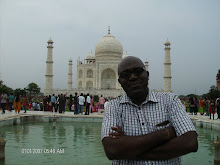IDEAS RULE THE WORLD
_____________________________
_____________________________
“Everything that can be invented has been invented” – Charles H. Duell,
Commissioner for US Patent and Trademark Office, 1899.
In retrospect, sitting under an apple tree would ordinarily not qualify as the most remarkable thing to do as a preface to giving birth to modern Physics. Well, not if your name is Isaac Newton and instead of promptly eating a fallen apple, as I daresay many would have, he proceeded to theorise on the seemingly mundane question - what made the apple fall? Several centuries later, the answer to that question has come to lie at the heart of some of the more spectacular achievements recorded by science and what it is yet to unfurl.
As centuries go, the 20th typifies so much of the sovereignty of ideas. Ideas represent a template for change; quite often they portend a revolt. Henry Ford brought to life the possibility of everyone owning the then new cranky device known as a car. Some ideas are matchless in their simplicity; the ubiquitous paper clip and Post-it pad arose as means to hold and flag documents respectively. Yet ideas can equally be profound enough to lay the foundation of a nation: the United States was founded on philosophical ideas. At other times, ideas have also emasculated nations: both Louis XVI’s France and the defunct Soviet Union eventually succumbed to the idea of freedom which it so resented for decades. Naturally, nations have warred over their cherished ideas: the Allied and Axis Powers clashed in World War II. Slavery, the Cold War, Apartheid and similarly discarded concepts were eventually slain by the antithesis of the ideas they represented.
For all its utility, ideas have not been without its traducers. The Luddites violently opposed the new inventions wrought by the onset of the Industrial Revolution. And even more recently, hasn’t the Computer seem to threaten the established patterns of work for some? Ideas are the spark that translate dreams, the fuel that drives our passion, it is indeed a summation of mankind’s ability to generate, express, develop, improve and regenerate ideas that stand us out as the prime tenant on earth. The unsettling truth is that notwithstanding the abundance of resources, a deficit of the directional influence of ideas confines it all to the pitiful condition of much of sub-Saharan Africa – “a scar on the conscience of humanity”.
Into the 21st century, Isaac Newton’s answers and for that matter, of so many other great men of thought have continued to change our world. But wait a minute; is that to say that these ideas are cast in stone and immutable? Maybe. Perhaps, when next we see some fellow lounging under an apple tree, it may just be prudent to let him be. Who knows what question he’ll answer for the rest of us?
Commissioner for US Patent and Trademark Office, 1899.
In retrospect, sitting under an apple tree would ordinarily not qualify as the most remarkable thing to do as a preface to giving birth to modern Physics. Well, not if your name is Isaac Newton and instead of promptly eating a fallen apple, as I daresay many would have, he proceeded to theorise on the seemingly mundane question - what made the apple fall? Several centuries later, the answer to that question has come to lie at the heart of some of the more spectacular achievements recorded by science and what it is yet to unfurl.
As centuries go, the 20th typifies so much of the sovereignty of ideas. Ideas represent a template for change; quite often they portend a revolt. Henry Ford brought to life the possibility of everyone owning the then new cranky device known as a car. Some ideas are matchless in their simplicity; the ubiquitous paper clip and Post-it pad arose as means to hold and flag documents respectively. Yet ideas can equally be profound enough to lay the foundation of a nation: the United States was founded on philosophical ideas. At other times, ideas have also emasculated nations: both Louis XVI’s France and the defunct Soviet Union eventually succumbed to the idea of freedom which it so resented for decades. Naturally, nations have warred over their cherished ideas: the Allied and Axis Powers clashed in World War II. Slavery, the Cold War, Apartheid and similarly discarded concepts were eventually slain by the antithesis of the ideas they represented.
For all its utility, ideas have not been without its traducers. The Luddites violently opposed the new inventions wrought by the onset of the Industrial Revolution. And even more recently, hasn’t the Computer seem to threaten the established patterns of work for some? Ideas are the spark that translate dreams, the fuel that drives our passion, it is indeed a summation of mankind’s ability to generate, express, develop, improve and regenerate ideas that stand us out as the prime tenant on earth. The unsettling truth is that notwithstanding the abundance of resources, a deficit of the directional influence of ideas confines it all to the pitiful condition of much of sub-Saharan Africa – “a scar on the conscience of humanity”.
Into the 21st century, Isaac Newton’s answers and for that matter, of so many other great men of thought have continued to change our world. But wait a minute; is that to say that these ideas are cast in stone and immutable? Maybe. Perhaps, when next we see some fellow lounging under an apple tree, it may just be prudent to let him be. Who knows what question he’ll answer for the rest of us?
